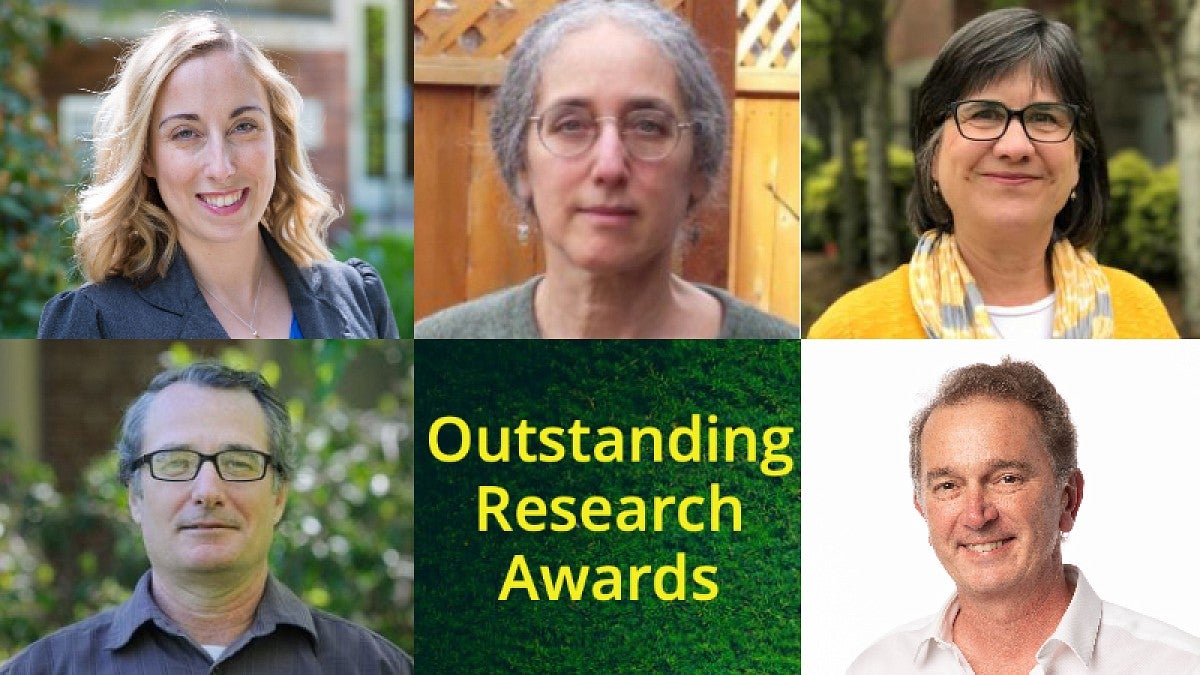One month after being elected into the National Academy of Sciences, UO biologist Alice Barkan has been recognized for her long record of distinguished scholarship and prominence in her field of research with an Outstanding Career Award. She was one of five UO faculty members to receive the 2020 Outstanding Research Awards.
“It’s an incredible honor to be named by your peers to the National Academy of Sciences” said David Conover, vice president for research and innovation. “It’s only fitting that our institution also acknowledge not only her scientific accomplishments but also her career contributions in teaching, mentorship and leadership at the UO.”
Presented by the Office of the Vice President for Research and Innovation, the awards celebrate the significant achievements of UO faculty members engaged in research and scholarly activity.
“All five recipients equally inspire us with their stellar work in everything from biology to psychology to earth sciences and we congratulate all of them on their awards,” Conover added.
Barkan was recognized for her research on how plants capture and process sunlight. Research in the Barkan Lab is directed at understanding how the genetic machineries in the chloroplast and nucleus of cells communicate to produce a chloroplast that is responsive to environmental and developmental cues.
The Early Career Award went to Autumn Shafer, an assistant professor in the School of Journalism and Communication. Her research addresses important social, theoretical, and practical issues related to public health promotion and social issues advocacy.
Her work includes grant-funded projects examining the effects of entertainment education on teen pregnancy, developing a sexual consent awareness campaign, cervical cancer prevention through the promotion of HPV vaccines and other areas of focus.
The honor recognizes tenure-track faculty members at the assistant professor rank who have a track record of significant scholarship and emergent recognition, and a productive and impactful scholarly record.
The innovation and impact award was presented to Doug Toomey, a professor in the Department of Earth Sciences. Toomey was credited for his work to obtain sustained support for earthquake early warning systems in Oregon that have expanded into monitoring and warning for wildfire, landslides and floods.
His engagement with the science and hazard community has led to an uptick in staffing and funding for the Oregon Hazards Lab. This required getting support from the state of Oregon, which led to a commitment from the U.S. Geological Survey and the UO’s inclusion in the group of university partners in the ShakeAlert program.
The award is given to an outstanding individual or team that distinguished themselves and the university through entrepreneurial activities that resulted in innovations with measurable societal or environmental benefits.
The award has been expanded to include individuals who made contributions through broader public engagement activity. That includes proactively sharing research or viewpoints on research and policy issues with the public via traditional or new media channels, an acknowledgement that those efforts serve the larger mission of creating and disseminating knowledge for the benefit of the community, the region and the world.
One of two awards for outstanding accomplishment by a non-tenure-track faculty researcher goes to Ann Glang, a research professor and co-director of the Center for Brain Injury Research and Training. Her research helps individuals with acquired brain injuries adapt and return to their previous activities and also guides those who teach and work with individuals who have brain injuries.
Glang was singled out for her long record of research accomplishments and productivity, which have served to change the lives of brain-injured children and adults. She was also credited for her advocacy for children with brain injuries and her broader goals of implementing real-world improvements. She also has served as a role model and academic leader who has provided mentorship and guidance for many mostly female scientists and practitioners in the area of neurorehabilitation.
A second award for outstanding accomplishment by a non-tenure-track faculty researcher goes to Robert Parker, a senior research assistant and the executive director of the Institute for Policy Research and Engagement and the director of the Community Planning Workshop Program. Parker, who is retiring later this month, was singled out for his accomplishments and contributions to transforming communities through research and action.
An expert on housing, economic development and natural resources, Parker has conducted research with a statewide focus on housing affordability and created the University of Oregon Economic Development Administration University Center. The center connects communities with resources for sustainable economic development.
His numerous projects have had a major impact on Oregon in the areas of housing, economic development and natural resources, and his legacy will carry on through the work of the more than 600 students and colleagues who have played roles in his research.


